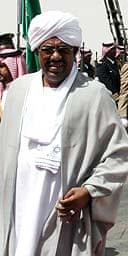The Sudanese government today declared its willingness to observe a ceasefire with rebel forces when peace talks start next month on the conflict in Darfur.
The pledge came from the Sudanese president, Omar al-Bashir, at a news conference in Rome after talks with the Italian prime minister, Romano Prodi.
"We have announced we are available (to put in place) a ceasefire with the start of the negotiations to create a positive climate," Mr Bashir said, speaking through a translator. "We hope that the negotiations in Tripoli will be the last ones and that they will bring a final peace."
After much prodding from the UN secretary general, Ban Ki-Moon, the Sudanese government and rebel leaders have agreed to fresh peace talks starting on October 27 in Libya.
Mr Ban, unlike western leaders, has refrained from denouncing the Bashir government for human rights abuses, instead showing restraint in an effort to get peace talks going. He has been told by advisers that most of the violence is between rival clans and not caused by government forces.
A ceasefire agreed in April 2004 has been violated frequently by all sides - government troops, rebels and the janjaweed militias.
More than 200,000 people have died and 2.5 million have fled their homes since ethnic African rebels in Darfur in western Sudan took up arms against the Arab-dominated Sudanese government in 2003.
While welcoming Mr Bashir's statement as a strong and important signal, Mr Prodi said he had expressed the "serious concerns" of the Italian government and European countries over the Darfur crisis to the Sudanese president, who was also due to meet Pope Benedict on this rare high-profile visit to western Europe.
The peace talks coincide with the deployment of a UN force of 26,000 soldiers and police to protect civilians, as agreed by the UN security council in July. The "hybrid" African Union/UN force will have tougher powers than the under-resourced African monitors presently in Darfur, but will still consist mainly of Africans, at Sudanese insistence.
Mr Bashir came to power in 1989 in a military coup.
Human rights groups have urged Mr Prodi and the Pope to call on Sudan to fulfil its legal duty to arrest International Criminal Court suspects.
The American group Human Rights Watch has condemned the Sudanese government's decision to appoint an ICC suspect, Ahmed Haroun, to chair a committee hearing human rights complaints from victims in Darfur.
Mr Haroun, currently the state minister of humanitarian affairs, is wanted by the ICC on 42 counts of crimes against humanity and war crimes. Its judges found "reasonable grounds to believe" that Mr Haroun is responsible for attacks and rapes of civilians in four western Darfur villages in 2003 and 2004. Human Rights Watch said: "Evidence indicates that Haroun recruited, paid and supplied arms to the government-backed janjaweed militias who carried out the attacks."
"Nominating a suspected war criminal to hear human rights complaints from Darfur's victims is outrageous and shows the government's utter disregard for their plight," said Lotte Leicht, EU advocacy director at Human Rights Watch.
"The Italian government cannot stand by silently while President Bashir is in Rome, the birthplace of the International Criminal Court."
